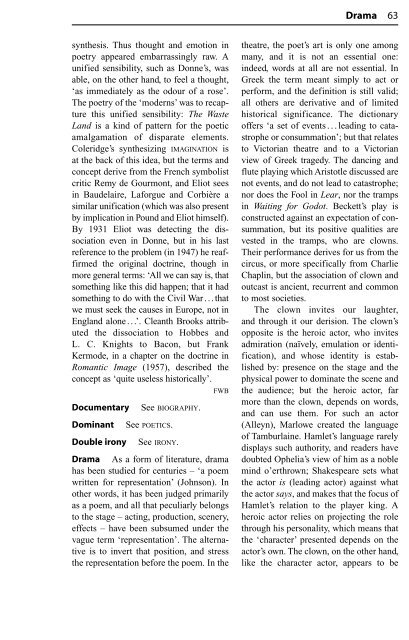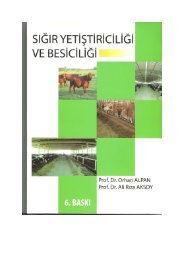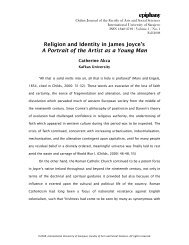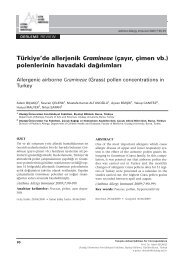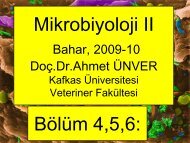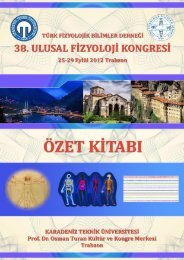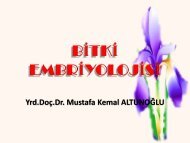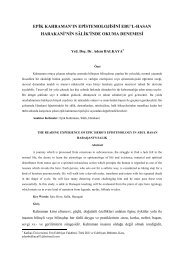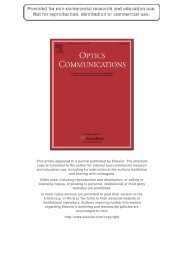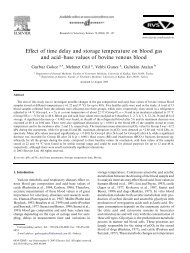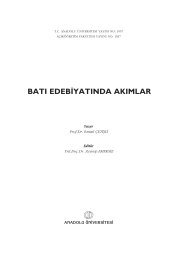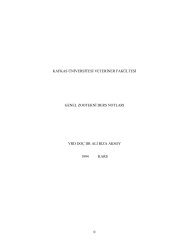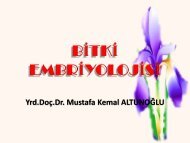The Routledge Dictionary of Literary Terms
The Routledge Dictionary of Literary Terms
The Routledge Dictionary of Literary Terms
You also want an ePaper? Increase the reach of your titles
YUMPU automatically turns print PDFs into web optimized ePapers that Google loves.
synthesis. Thus thought and emotion in<br />
poetry appeared embarrassingly raw. A<br />
unified sensibility, such as Donne’s, was<br />
able, on the other hand, to feel a thought,<br />
‘as immediately as the odour <strong>of</strong> a rose’.<br />
<strong>The</strong> poetry <strong>of</strong> the ‘moderns’ was to recapture<br />
this unified sensibility: <strong>The</strong> Waste<br />
Land is a kind <strong>of</strong> pattern for the poetic<br />
amalgamation <strong>of</strong> disparate elements.<br />
Coleridge’s synthesizing IMAGINATION is<br />
at the back <strong>of</strong> this idea, but the terms and<br />
concept derive from the French symbolist<br />
critic Remy de Gourmont, and Eliot sees<br />
in Baudelaire, Laforgue and Corbière a<br />
similar unification (which was also present<br />
by implication in Pound and Eliot himself).<br />
By 1931 Eliot was detecting the dissociation<br />
even in Donne, but in his last<br />
reference to the problem (in 1947) he reaffirmed<br />
the original doctrine, though in<br />
more general terms: ‘All we can say is, that<br />
something like this did happen; that it had<br />
something to do with the Civil War...that<br />
we must seek the causes in Europe, not in<br />
England alone...’. Cleanth Brooks attributed<br />
the dissociation to Hobbes and<br />
L. C. Knights to Bacon, but Frank<br />
Kermode, in a chapter on the doctrine in<br />
Romantic Image (1957), described the<br />
concept as ‘quite useless historically’.<br />
FWB<br />
Documentary See BIOGRAPHY.<br />
Dominant See POETICS.<br />
Double irony See IRONY.<br />
Drama As a form <strong>of</strong> literature, drama<br />
has been studied for centuries – ‘a poem<br />
written for representation’ (Johnson). In<br />
other words, it has been judged primarily<br />
as a poem, and all that peculiarly belongs<br />
to the stage – acting, production, scenery,<br />
effects – have been subsumed under the<br />
vague term ‘representation’. <strong>The</strong> alternative<br />
is to invert that position, and stress<br />
the representation before the poem. In the<br />
Drama 63<br />
theatre, the poet’s art is only one among<br />
many, and it is not an essential one:<br />
indeed, words at all are not essential. In<br />
Greek the term meant simply to act or<br />
perform, and the definition is still valid;<br />
all others are derivative and <strong>of</strong> limited<br />
historical significance. <strong>The</strong> dictionary<br />
<strong>of</strong>fers ‘a set <strong>of</strong> events...leading to catastrophe<br />
or consummation’; but that relates<br />
to Victorian theatre and to a Victorian<br />
view <strong>of</strong> Greek tragedy. <strong>The</strong> dancing and<br />
flute playing which Aristotle discussed are<br />
not events, and do not lead to catastrophe;<br />
nor does the Fool in Lear, nor the tramps<br />
in Waiting for Godot. Beckett’s play is<br />
constructed against an expectation <strong>of</strong> consummation,<br />
but its positive qualities are<br />
vested in the tramps, who are clowns.<br />
<strong>The</strong>ir performance derives for us from the<br />
circus, or more specifically from Charlie<br />
Chaplin, but the association <strong>of</strong> clown and<br />
outcast is ancient, recurrent and common<br />
to most societies.<br />
<strong>The</strong> clown invites our laughter,<br />
and through it our derision. <strong>The</strong> clown’s<br />
opposite is the heroic actor, who invites<br />
admiration (naïvely, emulation or identification),<br />
and whose identity is established<br />
by: presence on the stage and the<br />
physical power to dominate the scene and<br />
the audience; but the heroic actor, far<br />
more than the clown, depends on words,<br />
and can use them. For such an actor<br />
(Alleyn), Marlowe created the language<br />
<strong>of</strong> Tamburlaine. Hamlet’s language rarely<br />
displays such authority, and readers have<br />
doubted Ophelia’s view <strong>of</strong> him as a noble<br />
mind o’erthrown; Shakespeare sets what<br />
the actor is (leading actor) against what<br />
the actor says, and makes that the focus <strong>of</strong><br />
Hamlet’s relation to the player king. A<br />
heroic actor relies on projecting the role<br />
through his personality, which means that<br />
the ‘character’ presented depends on the<br />
actor’s own. <strong>The</strong> clown, on the other hand,<br />
like the character actor, appears to be


